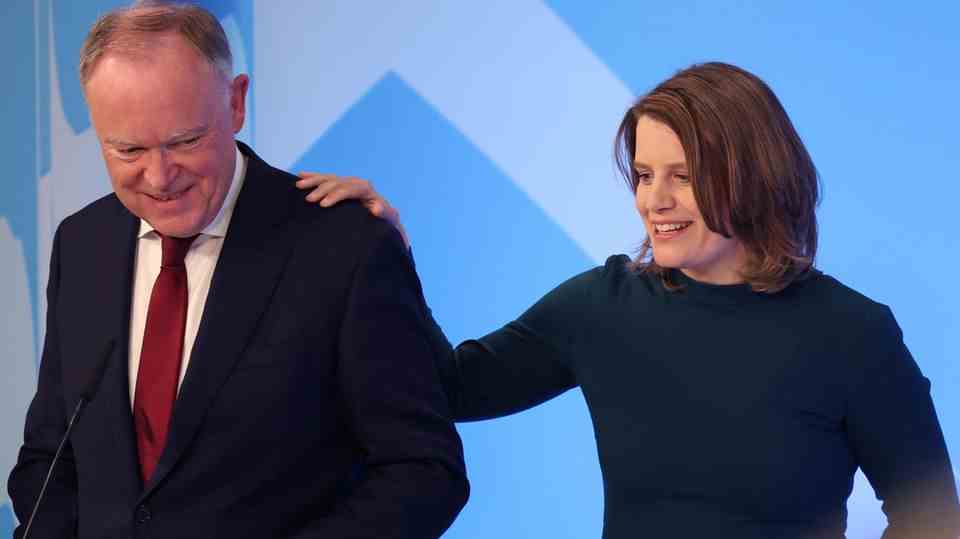“Anne Will”
Helpless search for answers and a Friedrich Merz who haunts the show like a poltergeist
How did this election outcome in Lower Saxony come about? A question that was discussed on “Anne Will”.
© NDR/Wolfgang Borrs
Anne Will discusses the outcome of the election in Lower Saxony without the FDP and AfD, but also without any surprises – but with great passion when it comes to the “social tourism” of the CDU leader.
On the evening of the Lower Saxony elections, Anne Will can only talk about war and Corona in passing. But it has to be somehow federally political: “Elections in uncertain times: does the traffic light get the receipt for its crisis policy?”
Who discussed?
Lars Klingbeil (SPD), party chairman
Ricarda Lang (Bündnis 90/Die Grünen), federal chairwoman
Jens Spahn (CDU), Member of the Presidium, Deputy Group Chairman in the Bundestag
Julia Reuschenbach, political scientist
Robin Alexander, Deputy Editor-in-Chief “Die Welt”
Hardly anything new to say
If the first extrapolation at 6 p.m. already triggers almost all the essential analyses, then a round of elephants four hours and countless politician interviews later does not have much new to contribute. Not even on the question of what all this means for the federal government or what it says about it. The SPD is supportive of the state (“We know what we have to do”), the Greens are appropriately humble (“We wanted more”) and the CDU is genuinely disappointed (“That’s a bitter result”). One is “not yet back in the presumption of competence,” says Jens Spahn, looking back at Merkel’s last 16 years. Then he still tries to score points, at least with a bit of traffic light bashing: “Even the obvious is not decided. The economics and finance ministers argue every day.”
Ricarda Lang, on the other hand, vehemently defends the incumbent federal government, almost more so than SPD leader Lars Klingbeil, who wants the FDP in the Lower Saxony state parliament. Meanwhile, Robin Alexander relegates the Greens to their old junior role in government. Then, in their absence, they talk a little about the decline of the FDP, the gas price cap and basic gas needs. Or about nuclear energy, which does not have as many friends in Gorleben & Castortransporte-Land as the Union and the FDP – for whatever reason – had hoped.
The smartest analysis sentences come from the political scientist Reuschenbach, who makes it clear that the much-cited influence of federal politics on these state elections is not so easy to identify and also classifies the meager approval ratings of the traffic light government: It is just an “untested alliance” that is being compared with black and yellow (2009-13) “not quite so bad”. The FDP attests that they are permanently in “internal opposition” to their own traffic light government.
The special moment in “Anne Will”
The debate only really comes alive when the speech comes to CDU leader Friedrich Merz, who is not even there, but will go down in history with his weeks-old accusation of “social tourism” (meaning refugees from Ukraine). Jens Spahn somehow wants to distance himself from it, but agree with Merz in terms of content and talk about “controlling migration”, while Ms. Lang speaks of “hardcore populism”, yes: Merz doesn’t really accept his apology and Lars Klingbeil says: “The country is further along as Friedrich Merz”. There is no evidence of “social tourism”, says Robin Alexander, who somehow believes that Merz only “accidentally said it”. Which political scientist Reuschenbach strongly doubts. Mr. Spahn, in turn, is silent on this, preferring to say in a Solomon style: “No one is more annoyed than Friedrich Merz”. Especially since his push to the right in the state elections just didn’t pay off for him.
The findings of the elephant round
According to surveys, 80 percent of voters in Lower Saxony think that the federal government should decide faster and 67 percent that Chancellor Olaf Scholz seems “hesitant and undecided”; almost half of the SPD supporters think so. In addition, 73 percent stated that they were worried that their income would fall noticeably – almost all of the AFD supporters were concerned. The situation is similar when you worry about not being able to pay your own bills. And 42 percent of those surveyed have doubts as to whether Economics Minister Robert Habeck (Greens) is up to his task.
Conclusion
“We need functioning crisis communication,” says the political scientist Reuschenbach at the end. But that’s always the case. “We need a new tolerance for mistakes in politics,” she adds. That’s correct. A big task. For all.



